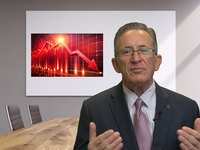- Categories :
- More
The Crystal Ball Myth: Why Even Top Traders Can’t Beat Efficient Markets

When researchers recently gave professional traders advanced knowledge in what they call the Crystal Ball Challenge, you’d think with that information they’d significantly outperform the markets. Think again.
This is a great experiment, and I thought it was very relevant for a short video. The experimenters gave the traders advanced knowledge of a move. A good example would be the recent interest rate cut. They gave them advanced knowledge of what the move was, but they didn’t tell them how significant the move would be. Again, in this case, would it be a quarter-point move or a half-point move? Despite the advanced knowledge, the best traders got their bets right just 63% of the time, and they were top-tier investors. The vast majority actually took pretty bad hits on their investments.
This is very important and leads to some pretty interesting insights that I always try to make sure my clients understand. The experiment was inspired by Nicholas Taleb. If anyone has heard the term Black Swan, he’s the one who coined it. He wrote the famous book The Black Swan: The Impact of the Highly Improbable. Fascinating book, great read—one of the best financial writers of the 21st century.
What do we get from this information? What we get from this test is knowledge of just how efficient markets really are. Even when we know what’s going to happen, not knowing how much is not enough. Even in the most recent interest rate cut, we had traders betting on zero, quarter, or half percentage points. It surprised a lot of people that it was a half-point. The only people who got this right were the ones who went all the way in this case.
Markets predict the weighted average of the knowledge of market participants. We call it the wisdom of crowds. In many respects, the wisdom of crowds is usually correct, but far more important is that the wisdom of the crowd tends to be the best bet out there. If you bet against that wisdom, you will, as a general rule, lose.
What does this mean for stock investors? We have this desire to look back at moves and say, “See, I saw that coming. I knew what was going to happen. I didn’t make the trade. I would’ve made money.” It wasn’t enough, however, to see it coming—you needed to see the extent.
Markets are remarkably efficient. They don’t have to be right to be efficient. All that “efficient” means is that, given the available information, consistently beating the markets is next to impossible. It doesn’t mean that the price is right, which is a misunderstanding that a lot of investors have.
This is why we recommend people put together asset allocation models that reflect the different returns projected for the different asset classes and take into account the risk tolerance of the investor. We’re not trying to time the markets. If you have any questions about this or anything else related, please give me a call. We wish you the best of investment success. Thank you.
Sources
Based on the paper, titled When a Crystal Ball Isn’t Enough to Make You Rich.
By: Paul J. Carroll, CFP















